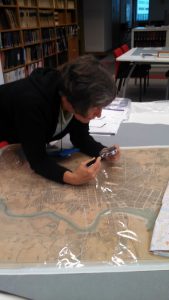 While the variety of televised programs about family history have certainly increased interest in the hobby, I fear that it has begun to supply a skewed approach to genealogical research. So many of these shows show others doing the research for the person, and then making the big reveal, that more often than not we find visitors to the NEHGS Research Center here in Boston expecting us to do the actual research for them.
While the variety of televised programs about family history have certainly increased interest in the hobby, I fear that it has begun to supply a skewed approach to genealogical research. So many of these shows show others doing the research for the person, and then making the big reveal, that more often than not we find visitors to the NEHGS Research Center here in Boston expecting us to do the actual research for them.
Don’t get me wrong – I love to assist family historians with their research. We all need a little guidance from time to time as we struggle with a particular line on the family tree. And I understand that for many people this is a new hobby and they may not understand what to do. Again, I am happy to assist in getting those individuals started. I still remember when I first got involved in family history – back in the pre-computer dark ages of handwritten charts and forms and drafting countless letters to repositories, town halls, and county clerks.
I also remember being one of those “odd” individuals who was interested in family history. We would huddle together at the annual conferences, drawing strength from the fact that we weren’t as alone as we originally thought. There were people interested in how we discovered a record or located that private cemetery, as opposed to our own family who tried, not too successfully, to stifle yawns as we shared such information. There were certainly others eager to hear how best to research in the National Archives and what was on microfilm at the Family History Library.
I love the challenge when someone says “You can’t find my tree.”
It is this involvement and the hunt that are the fun for most family historians. I have often said at lectures that the day I need only click a single button and be shown an entire family tree I will need to find a new hobby. I love the challenge when someone says “You can’t find my tree.” I like the mental exercise required in figuring out what records or resources will break through a brick wall.
When you visit a repository, please do a little homework ahead of time. Almost every repository now has some information online about its holdings. If there is an online catalog, search it for localities and families you are researching. We have individuals who make a trip to Boston only to be disappointed because we don’t have the book or record they expected us to have. I feel so bad for them and dislike it that I have contributed to their disappointment.
If you are struggling with a language, we are happy to help. If you have never researched in French-Canadian records or don’t know what types of records might exist in Germany or Italy for your families, we are happy to assist you. But remember that family history – like golf, stamp collecting, or fishing – requires your involvement, too. It is not a passive hobby where you simply sit and watch others do it. After all, where is the fun in that?
Share this:
About Rhonda McClure
Rhonda R. McClure, Genealogist, is a nationally recognized professional genealogist and lecturer specializing in New England and celebrity research as well as computerized genealogy; is compiler of more than 120 celebrity family trees; has been a contributing editor for Heritage Quest Magazine, Biography magazine and was a contributor to The History Channel Magazine and American History Magazine. In addition to numerous articles, she is the author of ten books, including the award-winning The Complete Idiot's Guide to Online Genealogy, now in its second edition, Finding Your Famous and Infamous Ancestors, and Digitizing Your Family History.View all posts by Rhonda McClure →